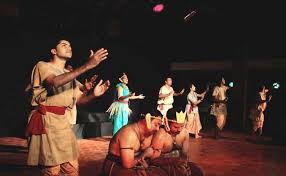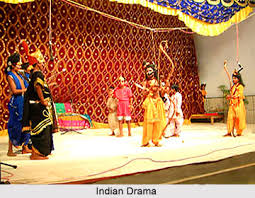Before writing a drama script, we first need to know what drama is.
 WHAT IS MEANT BY A DRAMA?
WHAT IS MEANT BY A DRAMA?
Drama is derived from the Greek word “dran” which means “to do” or “to act”. Drama is mimetic action, that is, action imitating or representing human behaviour. According to Aristotle, drama is an imitation of life, a cultural mirror and a reflection of truth. For Aristotle, the plot was the prime mover of a drama, and the drama must be constructed from three unities, namely action, place and time. These elements categorise drama as a branch of literature. drama includes the elements of the arts such as acting, music, architecture, fashion and dance.
In general, there are three types of drama:
Drama is not only to be read, but also to be acted on the stage, with different interpretations for its reading and performance on stage. A drama is a script that can be read on its own without the need for space, actors or other artistic support. When a drama script is acted out on the stage in combination with various other arts before an audience, it is called theatre.
DRAMA SCRIPT
A drama script is different from a novel, a short story or a poem. In novels
and short stories, the reader will be given a detailed description of a
situation and the background for a particular event, whereas in a drama script,
the reader will be given only an overview of a particular situation and the
location or place. The dialogue will deliver the message and thoughts of the
author. This is what distinguishes
drama from other literary works.
Indeed, the nature of a drama is driven by dialogue. The author’s thoughts or ideas are conveyed through dialogue by the actors (characters) interacting in a drama. A good drama script will be able to give a clear picture of the author's thoughts through the dialogue. Dramatic element means the diction or expressions that can create conflict in a drama, such as dialogue that elicits feelings of anger, delight, amusement, etc. A good drama should have an element of suspense, tension and be able to arouse the curiosity of its reader or audience.
STYLE AND CHARACTERISATION
Drama is an art form, It demands teamwork due to the inclusion of other artistic personnel and also because of the immediacy of reaction from the audience. A drama script is fixed and permanent in nature as a whole, but each time the drama is performed on stage, the production of the script will undergo changes. This is because the actors will react differently to different audiences, and also the mood of the actors is different in each show.

FEATURES OF DRAMA
Generally, drama has the following features:
• Drama is a modern prose produced to be read and staged.
• Drama can be in the form of prose or poetry.
• Drama consists of dialogues and characters created by the author.
• The thoughts and ideas of the author are conveyed through dialogue by the characters.
• Conflict, which is an important element in a drama script, is driven by the characters in the plot.
• A script that is not based on conflict is not considered as a good drama.
• The style of language in a drama is also important because it shows the setting and the society it represents, thus drama reflects the socio-culture of the society described by the author.
STRUCTURE OF DRAMA
In principle, drama has a three-act structure. The structure of all these scripts is divided into three parts.
A strong foundation will support the structure, concept and vision of a drama. It will produce a solid framework or creative work . Absence of a strong foundation will produce only frustration, impasse.
An impasse occurs because of the lack of planning. Without planning, it is difficult for the author to find the right direction or way to proceed with a story.
The three important elements that must be given focus by the author before writing a script are:
 Focus
Focus
To ensure coherence in a story, the characters and the way they function require focus or concentration regardless of whether the storyline is linear, non-linear or parallel. Consistent strong focus will make the process of writing easier and smoother. Focus requires a number of considerations. The main consideration is knowing the characters who are they?, their backgrounds, natures and development. Focus also requires the characterisation and overall storyline to have a clear goal in the end.
Logic
When we produce a story with all its characters, themes and locations, we are actually involved in creation. every character, theme, time and location has its own rules; it is like creating a new world. . Drama adopts or imitates reality of life. The reality of a drama must be viewed in the context of the story, characterisation and theme. This is where the logic of the drama is measured.

Character and Characterization
In a good drama script, the characters must be able to carry the story further. The characters are the most important element in a drama. They drive the plot. In a drama, there are main characters and supporting characters. Often a drama has one main character, or two main characters -who called the protagonist the character advocate the ideas of the author.The antagonist the character opposing the ideas of the author. Supporting characters are other characters that support the protagonist or antagonist or characters that complete the story.
Drama is derived from the Greek word “dran” which means “to do” or “to act”. Drama is mimetic action, that is, action imitating or representing human behaviour. According to Aristotle, drama is an imitation of life, a cultural mirror and a reflection of truth. For Aristotle, the plot was the prime mover of a drama, and the drama must be constructed from three unities, namely action, place and time. These elements categorise drama as a branch of literature. drama includes the elements of the arts such as acting, music, architecture, fashion and dance.
In general, there are three types of drama:
- • Tragedy – A drama that tells the bittersweet and tragic life of its main character. The hero often suffers a tragic end. In this drama, tragedy is the main story.
- • Comedy – A drama that is told in a humorous and entertaining manner. Its content is serious, but delivered in the form of humour by the characters. This type of drama is often used as satire to ridicule society. The plot of a comedic drama may end satisfactorily for the audience or it may also end in sorrow. This type of drama is also known as a tragic-comedy.
- • Melodrama – This drama is sentimental in nature and the story is often centred on family or women’s issues. It will usually affect the reader or audience emotionally.
Drama is not only to be read, but also to be acted on the stage, with different interpretations for its reading and performance on stage. A drama is a script that can be read on its own without the need for space, actors or other artistic support. When a drama script is acted out on the stage in combination with various other arts before an audience, it is called theatre.
DRAMA SCRIPT
Indeed, the nature of a drama is driven by dialogue. The author’s thoughts or ideas are conveyed through dialogue by the actors (characters) interacting in a drama. A good drama script will be able to give a clear picture of the author's thoughts through the dialogue. Dramatic element means the diction or expressions that can create conflict in a drama, such as dialogue that elicits feelings of anger, delight, amusement, etc. A good drama should have an element of suspense, tension and be able to arouse the curiosity of its reader or audience.
STYLE AND CHARACTERISATION
Drama is an art form, It demands teamwork due to the inclusion of other artistic personnel and also because of the immediacy of reaction from the audience. A drama script is fixed and permanent in nature as a whole, but each time the drama is performed on stage, the production of the script will undergo changes. This is because the actors will react differently to different audiences, and also the mood of the actors is different in each show.
FEATURES OF DRAMA
Generally, drama has the following features:
• Drama is a modern prose produced to be read and staged.
• Drama can be in the form of prose or poetry.
• Drama consists of dialogues and characters created by the author.
• The thoughts and ideas of the author are conveyed through dialogue by the characters.
• Conflict, which is an important element in a drama script, is driven by the characters in the plot.
• A script that is not based on conflict is not considered as a good drama.
• The style of language in a drama is also important because it shows the setting and the society it represents, thus drama reflects the socio-culture of the society described by the author.
STRUCTURE OF DRAMA
In principle, drama has a three-act structure. The structure of all these scripts is divided into three parts.
A strong foundation will support the structure, concept and vision of a drama. It will produce a solid framework or creative work . Absence of a strong foundation will produce only frustration, impasse.
An impasse occurs because of the lack of planning. Without planning, it is difficult for the author to find the right direction or way to proceed with a story.
The three important elements that must be given focus by the author before writing a script are:
- o Focus
- o Logic
- o Characterisation
To ensure coherence in a story, the characters and the way they function require focus or concentration regardless of whether the storyline is linear, non-linear or parallel. Consistent strong focus will make the process of writing easier and smoother. Focus requires a number of considerations. The main consideration is knowing the characters who are they?, their backgrounds, natures and development. Focus also requires the characterisation and overall storyline to have a clear goal in the end.
Logic
When we produce a story with all its characters, themes and locations, we are actually involved in creation. every character, theme, time and location has its own rules; it is like creating a new world. . Drama adopts or imitates reality of life. The reality of a drama must be viewed in the context of the story, characterisation and theme. This is where the logic of the drama is measured.
Character and Characterization
In a good drama script, the characters must be able to carry the story further. The characters are the most important element in a drama. They drive the plot. In a drama, there are main characters and supporting characters. Often a drama has one main character, or two main characters -who called the protagonist the character advocate the ideas of the author.The antagonist the character opposing the ideas of the author. Supporting characters are other characters that support the protagonist or antagonist or characters that complete the story.


















You have an interesting blog. thanks for sharing, I enjoyed reading your posts
ReplyDeleteThanks for your encouraging comment Sridhar
ReplyDeleteThis is very informative.
ReplyDeleteThis blog is helpful, I have learnt a lot from this.
ReplyDeletethank You
Delete